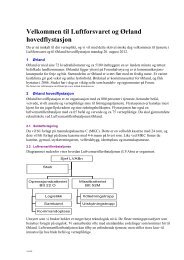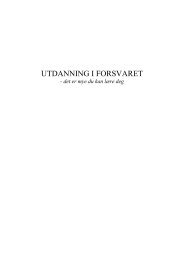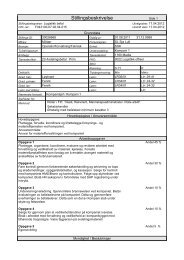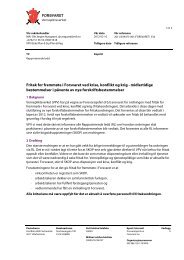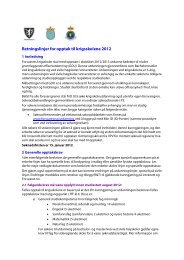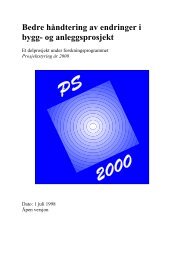Litteraturstudie - Tidligfasevurdering av prosjekter - Concept - NTNU
Litteraturstudie - Tidligfasevurdering av prosjekter - Concept - NTNU
Litteraturstudie - Tidligfasevurdering av prosjekter - Concept - NTNU
You also want an ePaper? Increase the reach of your titles
YUMPU automatically turns print PDFs into web optimized ePapers that Google loves.
CONCEPTFront-end Management of Major ProjectsSikring <strong>av</strong> store investerings<strong>prosjekter</strong>Ghasemzadeh, F. and Archer, NP, Project portfolio selection through decision support,Michael G. DeGroote School of Business, McMaster University, Hamilton, Ontario, Canada,Decision Support Systems, 29 (2000).Project portfolio selection is a crucial decision in many organizations, which mustmake informed decisions on investment, where the appropriate distribution ofinvestment is complex, due to varying levels of risk, resource requirements, andinteraction among the proposed projects. In this paper, we discuss the implementationof an organized framework for project portfolio selection through a decision supportsystem (DSS), which we call Project Analysis and Selection System (PASS). Wedescribe the results of laboratory tests Ulldertaken to measure its usability andquality, compared to manual selection processes, in typical portfolio selectionproblems. We also discuss the potential of PASS in supporting corporate decisionmaking, through exposure this system has received through demonstrations forseveral companies.Hartman, George, Risk is Still a Four Letter Word, Stoddart Publishing Co. Limited, ISBN 0-7737-6110-1, Canada, 2000.In this book the author proves that investing is about process, rather than numbercrunching.The author says that it is better to be approximately right than preciselywrong. He get specific about how to assess the different types of risks, How todetermine your personal investment philosophy - and create an investement policystatement to marry it with your strategy, how to use asset allocation to reduce risk andboost your portfolio performance and how to rebelance your portfolio to maintainyour desired risk/reward quotient.Klemkosky, R. C Maness, T. S., The predictability of real portfolio risk levels, The Journal ofFinance, No. 2, 1978, USA 1978.This study investigate whether mutual fund risk levels are stationary and thereforepredictable enough to be used by investors in making investment decisions andmeasuring ex post risk-adjusted performance. While much of the unsystematic risk iseliminated in mutual fund portfolios, the results of this study clearly show that thesystematic risk levels were not constant, and systematic risk could not be predictedfrom prior risk levels with a high degree of certainty.Lund, L. P., Porteføljestyring <strong>av</strong> <strong>prosjekter</strong>, Studentprosjekt, Institutt for bygg- oganleggsteknikk, <strong>NTNU</strong>, Norge, 2001.11.28Denne studentoppg<strong>av</strong>en er utført i forbindelse med et prosjekt somFinansdepartementet har initiert, og som er lagt inn under CONCEPT. Utførende parter Dovre. Det er i rapporten identifisert og bearbeidet faglitteratur innenporteføljeledelse, seleksjon <strong>av</strong> <strong>prosjekter</strong>, rangering <strong>av</strong> <strong>prosjekter</strong>, usikkerhetsstyringog programstyring. Konklusjonene går på at det er funnet lite eller svært lite litteratursom omhandler styring <strong>av</strong> samlet <strong>av</strong>setning på porteføljenivå og systematisk ogusystematisk risiko i <strong>prosjekter</strong>.Sandvold, Øyvind, Programstyring : implementering <strong>av</strong> strategiske endringer, BI, Institutt forteknologiledelse, Tano Aschehoug, ISBN 82-518-3826-6, Norge, 1999.Endring har blitt en konstant utfordring for dagens organisasjoner. Programstyringhjelper en å innføre en strategi eller en endring der man skal oppnå et ønsketLitteraturstudium innen tidligfasevurderinger <strong>av</strong> <strong>prosjekter</strong> 53




